#Steven Kotler
Explore tagged Tumblr posts
Text
“The human individual lives usually far within his limits; he possesses powers of various sorts which he habitually fails to use. He energizes below his maximum, and he behaves below his optimum. In elementary faculty, in coordination, in power of inhibition and control, in every conceivable way, his life is contracted like the field of vision of an hysteric subject—but with less excuse, for the poor hysteric is diseased, while in the rest of us, it is only an inveterate habit—the habit of inferiority to our full self—that is bad.”
-William James, Energies of Man
2 notes
·
View notes
Text
Review: The Devil's Dictionary by Steven Kotler
Author: Steven KotlerPublisher: St. Martin’s PressReleased: April 19, 2022Received: NetGalley I’ve been picking up a lot of authors that I’ve never read before, so why not keep the trend going? The Devil’s Dictionary, written by Steven Kotler, is the first I’ve read by this author – though I can already tell that I enjoy his style. Many experts have theorized that humanity will fracture…

View On WordPress
#Book#Book Review#Books#Fiction#Literary#Literature#Net Galley#NetGalley#Review#Science Fiction#Science Fiction Review#St. Martin&039;s Press#Steven Kotler#The Devil&039;s Dictionary#The Devil&039;s Dictionary by Steven Kotler
2 notes
·
View notes
Text
Last Tango in Cyberspace
This week I read Last Tango in Cyberspace by Steven Kotler. It was a cyberpunk novel that leaned way harder into "punk" than "cyber," and it wasn't particularly good. It read very much like a cyberpunk book from the 00s, but with tech companies like Apple and Uber everywhere instead. It mostly felt like it was trying too hard
The story followed Lion Zorn em-tracker and author self-insert. He uses his preternatural level of empathy to track changes in the cultural zeitgeist and predict which memes to follow to choose the right direction for his clients' companies. On this job, his client, a tech company called Arctic, is developing a new drug for inducing empathy and has him look into the brutal murder of a big game hunter. Meanwhile, a deep underground counterculture group called the Rilkeans are also after the drug, and their relationship with Arctic is very unclear. (The only real cyber part of this novel is that Arctic has an AI deep-scrubbing the internet of anything about the Rilkeans, which they may or may not have hired Arctic to do)
The book is mostly about animal rights and ecological collapse. Lion got deep into animal rights activism at one point, and this story is about Arctic pulling him back into that one more time. Somehow his empathy powers make him see all animals as part of his immediate family, and the drug everything revolves around makes the people taking it feel that way too. Arctic and the Rilkeans don't even disagree that it's important, it's just their approach: Arctic wants to shock the system by introducing it as a party drug (a la MDMA), whereas the Rilkeans want to integrate it to society via their woohoo religion (a la psilocybin). I don't think it crosses the line to preachy, but it's so incredibly blunt. If you want ecopunk, I think Tusks of Extinction pulls it off way better
It does have one trope I really hate, though. The hot assistant girl at Arctic starts flirting with Lion, which he correctly identifies may be because Arctic is paying her to spy on him, but he goes along with it anyway. Then it turns out she was a double agent for the Rilkeans, and he starts to wonder if maybe the Rilkeans were the ones paying her to sleep with him instead. And in the end, yes! She was using him the whole time, obviously! If he wasn't high for two-thirds of the book, maybe he could've figured that out. And then at the end of the story he stays in a relationship with her anyway. What is wrong with you, dude
1 note
·
View note
Quote
Vance says that the poor are poor because they use drugs, because they're lazy, because they come from broken homes. But there are lots of lazy rich people—just look at Donald Trump. There are lots of rich people who use drugs too; in the recent bestseller Stealing Fire, Jamie Wheal and Steven Kotler boast about all the billionaires they've seen doing psychedelics at Burning Man. There's no shortage of rich people who get divorced either. Look at Trump, again. If you can stand it.
J.D. Vance Hates Poor People
10 notes
·
View notes
Note
BTS as books bpp?
***
Oh lawd.
Okay, let's see.
Namjoon - Hard-boiled Wonderland and the End of the World by Haruki Murakami
Seokjin - Shoe Dog by Phil Knight
Yoongi - Educated by Tara Westover
Hoseok - Stealing Fire by Jamie Wheal and Steven Kotler
Jimin - Normal People by Sally Rooney
Taehyung - Purity by Jonathan Franzen
Jungkook - Giovanni's Room by James Baldwin
19 notes
·
View notes
Text
Weird & Wonderful Wednesday

I mean, it’s required that I read all the books and stories where someone allows a ‘small implant’ to be put in their head. In this case it’s the Pulse brain implant, put there so that they can better connect to the Panopticon network. But, not surprisingly, the government has oversight of it, and, well… it goes where you think it would go. Let’s just say that it goes more the way of dystopia than hearts and puppies and openness.
What have I learned from reading Science Fiction for *mumble mumble* years? Two things, don’t don’t don’t ever let anyone put ‘just a small implant’ in your head or your body or do something that in anyway it can’t be taken off, stepped in, thrown away, etc. Oh, and, also, keep a second or third pair of glasses in case you step on one.
In all seriousness though, this was an interesting take on what I like to think of as ‘implant fiction’, as well as a really really fun take on the Orpheus and Eurydice myth. As a lifelong fan of all Greek myth, that is what pulled me in, and I really liked how it was interwoven throughout the story. It was a fun read. Just… no implants, more than one pair of prescription glasses.
You may like this book If you Liked: The Memory Librarian by Janelle Monae, The Devil's Dictionary by Steven Kotler, or Noor by Nnedi Okorafor
More Perfect by Temi Oh
2 notes
·
View notes
Text
David Thien Anh Luong - Top 9 Books On Digital Transformation For Digital Entrepreneurs
With the advent of technology, businesses have been undergoing a digital transformation in the past decade and keeping up with the change is key to success. An integral part of the reason David Thien Anh Luong Why You Need the Most Viable Business Ethics to Run a Successful Business, here are the best books to read on digital transformation.

1. Digital Trailblazer: Essential Lessons to Jumpstart Transformation and Accelerate Your Technology Leadership
Author: Isaac Sacolick
Year: 2022
Goodreads Rating: 4.6/5
This book provides invaluable insights into how to strive through challenges in business by keeping up with technological trends. 2. Designed for Digital: How to Architect Your Business for Sustained Success
Author: Martin Mocker, Cynthia Beath, Jeanne W. Ross
Year: 2019
Goodreads Rating: 4.3/5
If you are an established traditional business looking to achieve digital success, this is the book you should read. 3. The Future Is Faster Than You Think: How Converging Technologies Are Transforming Business, Industries, and Our Lives
Author: Steven Kotler, Peter Diamandis
Year: 2020
Goodreads Rating: 4.2/5
This one gives you a clear view of the radical impact of technology on human life and business. 4. The Digital Transformation Playbook: Rethink Your Business for the Digital Age
Author: David L. Rogers
Year: 2016
Goodreads Rating: 4.1/5
Competing and winning in a digital economy is harder than you think. This book can act as the perfect guide. 5. Driving Digital Strategy: A Guide to Reimagining Your Business
Author: Sunil Gupta
Year: 2018
Goodreads Rating: 4.1/5
If you wish to learn from the best companies that are navigating successfully through digital change, this book is the best choice. 6. The Technology Fallacy: How People Are the Real Key to Digital Transformation
Author: Garth R. Andrus, Gerald C. Kane, Jonathan R. Copulsky, Anh Nguyen Phillips
Year: 2019
Goodreads Rating: 4.1/5
This excellent book reminds you of the core principle behind every transformation in business, including digital transformation. 7. Why Digital Transformations Fail: The Surprising Disciplines of How to Take Off and Stay Ahead
Author: Tony Saldanha
Year: 2019
Goodreads Rating: 3.9/5
With a proven five-stage model to help you through the fast-paced digital evolution, this book is incredible. 8. Digital Transformation: Survive and Thrive in an Era of Mass Extinction
Author: Thomas Siebel
Year: 2019
Goodreads Rating: 3.9/5
If you want to learn how to harness the power of digitization to your profit, this is the book to read. 9. Leading Digital: Turning Technology into Business Transformation
Author: Didier Bonnet, George Westerman, Andrew McAfee
Year: 2014
Goodreads Rating: 3.8/5
Here’s a wonderful book with practical ideas for adapting to business transformations through digitization.
Conclusion
In short, these are some of the top books to go through if you are new to digital entrepreneurship. Of course, you can also go through David Thien Anh Luong Business Top Books to Read If You Want To Become A Morning Person to become productive at work. Good luck!
6 notes
·
View notes
Text
Bold: Transforming Ideas into Innovations for Future Success
Chapter 1 What's Bold by Peter H. Diamandis
"Bold" by Peter H. Diamandis is a book that explores how technology and innovation are shaping the future. Diamandis discusses the exponential growth of technology and its potential to solve some of humanity's biggest challenges. He argues that by leveraging technology, individuals and organizations can create abundance and make a positive impact on the world. The book also provides practical advice on how to think big, take risks, and create disruptive solutions. Overall, "Bold" is a call to action for individuals to embrace innovation and change the world for the better.
Chapter 2 Bold by Peter H. Diamandis Summary
In "Bold: How to Go Big, Create Wealth and Impact the World," Peter H. Diamandis reveals the key principles and strategies for achieving success in today's fast-paced, rapidly-changing world.
Diamandis argues that in order to succeed in the 21st century, individuals and companies must think bigger, take risks, and capitalize on cutting-edge technologies. He outlines the concept of "exponential thinking," which involves leveraging technology and innovation to create abundance and solve global challenges.
The book provides practical advice on how to harness the power of crowdsourcing, exponential technologies, and artificial intelligence to disrupt industries, create new markets, and revolutionize the way we live and work. Diamandis also emphasizes the importance of developing a "Massively Transformative Purpose" (MTP) that drives passion, innovation, and impact.
Overall, "Bold" is a compelling and inspiring guide for anyone looking to achieve extraordinary success in today's rapidly-changing world.

Chapter 3 Bold Author
Peter H. Diamandis is an American engineer, physician, and entrepreneur known for his work in the fields of space exploration, longevity, and healthcare.
He released the book "Bold: How to Go Big, Create Wealth and Impact the World" in 2015, co-authored with Steven Kotler. The book explores how entrepreneurs can harness technological advancements to create successful businesses that have a positive impact on society.
Some of the other books written by Peter H. Diamandis include "Abundance: The Future Is Better Than You Think," "The Future is Faster Than You Think," and "How to Make a Spaceship: A Band of Renegades, an Epic Race, and the Birth of Private Spaceflight."
In terms of editions, "Abundance: The Future Is Better Than You Think" is perhaps the most popular and influential book by Peter H. Diamandis, with multiple editions and translations available.
Chapter 4 Bold Meaning & Theme
Bold Meaning
The book "Bold" by Peter H. Diamandis explores the concept of exponential technology and how entrepreneurs can leverage these technologies to create innovative and successful businesses. Diamandis argues that in today's world, with rapid advancements in technology, it is possible for individuals to create disruptive businesses that can solve some of the world's biggest problems. The book emphasizes the importance of thinking big, taking risks, and embracing failure as essential components of creating a successful and impactful business. Overall, "Bold" serves as a guide for aspiring entrepreneurs to harness the power of exponential technologies and create a bold and transformative future.
Bold Theme
The theme of the book "Bold" by Peter H. Diamandis is centered around the idea that exponential technologies are revolutionizing the way we live, work, and interact with the world. Diamandis argues that we are entering a new era of abundance, driven by innovations in fields such as artificial intelligence, robotics, 3D printing, and biotechnology. He encourages readers to think big, take risks, and harness the power of these technologies to create bold, game-changing solutions to some of the world's most pressing challenges. The book emphasizes the importance of embracing change, disrupting traditional business models, and constantly pushing the boundaries of what is possible. overall, the theme of "Bold" is about embracing disruption, taking risks, and using advanced technologies to create a better future for all.

Chapter 5 Quotes of Bold
Bold quotes as follows:
1. "The best way to predict the future is to create it ourselves."
2. "Failure is just a stepping stone on the path to success."
3. "Big challenges require big solutions."
4. "Innovators are the ones who are crazy enough to think they can change the world, and bold enough to actually do it."
5. "The only way to truly fail is to give up."
6. "The future belongs to those who are willing to take risks and think outside the box."
7. "Success is not about being the best, but about being the most bold and relentless in your pursuit of your goals."
8. "We live in a world of abundance, where anything is possible if we have the courage to dream big and take action."
9. "The biggest risk is not taking any risk at all."
10. "Don't wait for the perfect moment, take the moment and make it perfect."
Chapter 6 Similar Books Like Bold
1. "Brave New World" by Aldous Huxley - a classic dystopian novel that explores the dangers of a society controlled by technology and consumerism.
2. "The Handmaid's Tale" by Margaret Atwood - a gripping dystopian novel that explores themes of reproductive rights and the role of women in society.
3. "Fahrenheit 451" by Ray Bradbury - a thought-provoking novel that examines the consequences of censorship and the importance of free thought and expression.
4. "The Giver" by Lois Lowry - a young adult dystopian novel that follows a boy who discovers the dark truths behind his seemingly perfect society.
Youtube https://www.youtube.com/watch?v=4Fy68dJcg4s
Amazon https://www.amazon.com/Bold-Create-Wealth-Impact-World/dp/1476709580
Goodreads https://www.goodreads.com/book/show/22609444-bold

0 notes
Text










All-Star Superman by Grant Morrison, Frank Quitely, and Jamie Grant
I'd Rather Teach Peace by Colman McCarthy
What Dreams May Come by Richard Matheson
Quiet: The Power of Introverts in a World That Can't Stop Talking by Susan Cain
Abundance: The Future is Better Than You Think by Peter H. Diamandis and Steven Kotler
The Healing Power of Doing Good by Allan Luks and Peggy Payne
What Makes a Hero?: The Surprising Science of Selflessness by Elizabeth Svoboda
Good Omens: The Nice and Accurate Prophecies of Agnes Nutter, Witch by Terry Pratchett and Neil Gaiman
Doctor Who: Borrowed Time by Naomi A. Alderman
Why Are We Bad At Picking Good Leaders?: A Better Way to Evaluate Leadership Potential by Jeffrey Cohn and Jay Moran
0 notes
Text
''Flow is to extreme innovation what oxygen is to breathing—simply the biology of how it gets done.
Yet…when it comes to tackling the impossible, flow is necessary but not sufficient.
Pulling off the impossible…absolutely requires flow, but it also requires training up many of the same skills that flow amplifies: motivation, learning, and creativity. This may seem confusing, even contradictory, but the road toward impossible is long, and there will be lengthy stretches that we need to navigate without flow.
What’s more, to handle the exceptionally stable foundation. A car that hits a wall at ten miles per hour will dent a fender. Hit that same wall at a hundred miles per hour, and it’s a hell of a lot more than a fender that’s dented. The same is true for flow.''
-Steven Kotler, The Art of Impossible
1 note
·
View note
Text
THE THEORY OF FLOW: UNDERSTANDING THE SCIENCE OF OPTIMAL EXPERIENCE - CHAPTER - 01

We've all experienced moments where we are so completely absorbed in an activity that we lose track of time and feel a sense of fulfillment and joy. This state of consciousness is called flow, and it has been studied extensively in the fields of psychology, performance, and well-being.
Imagine running a cross country route. Our attention is focused on the movements of our body, the power of our muscles, the force of our lungs, and the feel of the ground beneath our feet. We are living in the moment, utterly absorbed in the present activity. Time seems to fall away. We are tired, but barely notice. This is an example of state of flow.
What is Flow?
Flow is a state of consciousness characterized by complete absorption in an activity, a sense of control, and an intense focus on the present moment. Flow typically occurs during activities that are challenging but not too difficult, and that provide a clear sense of progress or feedback. During flow, individuals experience a sense of enjoyment and fulfillment, and often report a feeling of "being in the zone." Flow has been studied extensively by psychologist Mihaly Csikszentmihalyi, who described it as a state of optimal experience.

Flow experiences can occur in different ways for different people. It often occurs when we are doing something that we enjoy and in which we are quite skilled. This state is often associated with the creative arts such as painting, drawing, or writing. However, it can also occur while engaging in a sport, such as skiing, tennis, soccer, dancing, or running.
There are several key components of flow that have been identified by researchers. These include clear goals and feedback, a balance between challenge and skill, a sense of control, intense concentration, and an altered sense of time. When these components are present, individuals are more likely to experience flow.
The Benefits of Flow
In addition to making activities more enjoyable, flow also has a number of other advantages, such as:

Flow has been associated with a range of positive outcomes, including increased creativity, productivity, and learning, as well as improved well-being and happiness. When individuals experience flow, they are more likely to be fully engaged and motivated in their activities, and they are more likely to achieve their goals. Cultivating flow in our lives requires a deep understanding of the key components of flow, as well as a commitment to creating conditions that support flow.
This might involve setting clear goals and providing feedback, designing tasks that challenge but do not overwhelm, and creating a supportive environment. It might also involve developing mindfulness and self-awareness, and learning to manage distractions and negative thoughts. There are ten factors that accompany the experience of flow. While many of these components may be present, it is not necessary to experience all of them for flow to occur:

The Neuroscience of Flow
While the psychology of flow has been extensively studied, recent research in neuroscience has shed light on the underlying mechanisms that allow us to achieve this state of optimal performance.

Attaining a Flow State
Sometimes, attaining a flow state is as simple as doing what we enjoy. A little bit of Critical self-reflection is all that may be needed. A few self-reflective stimuli (questions/ thoughts) that may be explored are:

The activity will lead us to more activities we can get engaged in to attain a Flow State, by revealing our ‘Flow Profile’.

Flow State Triggers
Steven Kotler published a book on the subject. The 17 Flow State triggers from his book are discussed below. Concisely, flow triggers are conditions that facilitate entry into a Flow state. These flow state triggers can catalyze flow states by either preparing us or our environment for them.

Flow states have triggers or pre-conditions that lead to more flow. Flow happens when we focus all our attention on the present moment so these triggers amplify flow by focusing our attention on the now. Using flow state triggers can help us boost our focus, creativity and performance. We all want to be focused and tap into flow states but it’s not easy in today’s hyper connected world where we are constantly being distracted. Flow triggers help to unlock the laser-like clarity and focus that we need to consistently achieve mindful peak performance.
Psychological triggers: The following four strategies are internally driven, and they work by focusing our attention on the present; what’s right in front of us, or the activity we’re engaged in.

Environmental triggers: Environmental triggers are aspects of our surroundings that help us get further into a flow state.

Social triggers: Social triggers have great importance if we are attempting to generate greater group flow. Some practical applications would include team sports, and workgroup dynamics.

Creative triggers
CREATIVITY: This concept gets linked into pattern recognition and risk-taking. Think of how the famous apple fell on Newton’s head before he bravely proposed the concept of gravity. Flow triggers creativity, which triggers flow, and so forth in a domino effect.
***To be continued in Chapter 02 (Importance of Flow in the Workplace, How Can We Measure Flow, Integrating The Concept of Flow in Education & Learning)

Content Curated by: Dr Shoury Kuttappa

#leadership#emotional intelligence#relationships#self awareness#change#behaviours#creativity#focus#decision making#decision intelligence#awareness#balance#feedback
0 notes
Link
“The flexibility mindset can actually be one of the greatest gifts you get to embrace and use to change your life for the better.” – Brian BuffiniIf you want more freedom in your business and your life, you have to learn to be flexible. In this episode, Brian teaches how...
0 notes
Text
"From the right angle, all of life is foreshadowing." ~ "West of Jesus," by Steven Kotler
0 notes
Text
HMsEx Blog Entry 5
Started editing my Liminal Exhilaration footage of streets and train tracks near my house. Tonight, I’ll go out again using a faster lens because my other lens does not perform well in low light. There was a lot of noise on all the clips and colour correction was quite difficult. However, after looking back at the nature of liminal space imagery, noise is a consistent part of the majority of the images; somewhat tying in with the method of giving the image a “washed out” look, covered in the last entry.
I shot in two image profiles, standard mode and “sunset” mode which made things look very warm and orange; I’d never used the image profiles on my camera before but I think next time I will definitely just stick to standard because now I have to colour grade the warm orange ones differently when I’m already very happy with my colour grade for the standard clips.
I recently found the name of the genre of music I’ve been loving so much recently, Synthwave.
Songs for Liminal Exhilaration:
Memory Reboot – VOJ & Narvent
Night Drive – Timecop1983
After Dark – Mr.Kitty
The Perfect Girl (The Motion Retrowave Remix) - Mareux
Research - Academic
The Psychology Podcast hosted by Scott Barry Kaufman – Steven Kotler chat
Scott made a very interesting point when discussing a recent finding he’s made in a paper to do with the 6 dimensions of curiosity in trying to predict creative achievement in life. He said he thought the dimension of joyous exploration would be the biggest predictor; he said that to their surprise they found that the biggest predictor was thrill seeking. Furthermore, he said that looking at the items on the thrill-seeking curiosity questionnaire they made, that the most common items were to do with the “thrill of mastery”. He didn’t get further into this but just hearing that quite interested me. Coming back to what we discussed the other day, about whether that exhilaration of landing a trick can really come through doing something you’ve done before, I believe this is very reassuring, even though Scott’s talking about curiosity, in the larger scheme of things they were talking about predicting creative achievement. Especially as Darrin made good points on how typically we never feel as elated as when we achieve something for the very first time, this finding of thrill of mastery a motivator for creative achievement to be very much in line with my personal experience, having this drive to perfect my practice, landing something for the first time will feel great but what’s the point if I can’t add this trick to the handful that I can confidently every single attempt, down stairs. So, here we see this constant of achievement, but also a further desire for mastery; I’m very happy this podcast has helped me articulate this because the other day in our conversation I couldn’t quite do so. The mastery that proceeds the first achievement is actually what drives the achievement in the first place, the whole art of skateboarding has always been based on this drive to hone our skills just as those more experienced that we’ve seen before us, seeing their fluency, consistency, and style that they take to every single pop of the tail. That drive is what keeps me hooked, I’m in it for the long run, I’m not here to land it once and then put it on the backburner, I need to own my tricks.
Research - Creative Practice
Principles & Methods for Achieving a Flow State | Voices w/ Vervaeke | John Vervaeke & Kevin Bowers
It’s interesting to hear discussion of the Flow State in that true “in the zone” sense, as in your completing a task with familiarity and ability. This is indeed a very common form of flow but not one that I’ve thought about much when thinking of my Liminal Exhilaration project however it is good that I’ve revisited this as it has decent relevance for my Skate Fear Psychology project. John and Kevin discuss achieving a flow state in a creative sense, to produce creative work and seemingly unblock paths that have been blocked for some reason. This idea of unblocking is very similar to the way that extreme sports enthusiasts view fear; where the average person may see fear as a relevant block that shouldn’t be tampered with.
“I want you to remember this feeling guys, like right now, you feeling it?” – Kevin Bowers
It sounds like Kevin does some really great work that allows people to become conscious of the flow state and what it feels like. This is essential for us to better understand and label the feeling of this state. Having common understanding is the first step towards collectively articulating what exactly the feeling is. However, the inherent subjectivity of exhilaration is a concern; or perhaps this notion is the issue in itself? Is exhilaration truly subjective or is it simply that no one has been able to provide a comprehensive ruleset for what can be deemed as exhilaration? This obviously questions more largely, are all things subjective simply waiting to be made sense of with objective theory, or rather, were all things objective once subjective? Quite perplexing.
Research - Technical
I watched some simple refresher videos on using Rotoscope and proceeded to mask out all my selves from one clip of a car park near my house. This was going well until I went in front of a dark background (I was wearing a black hoodie). Here’s a look:
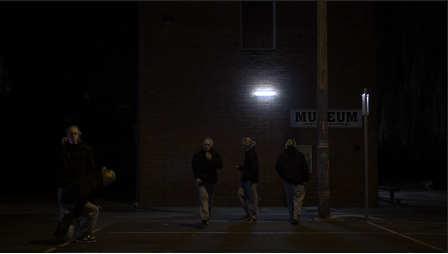
Issues:
In case rotoscoping wasn’t time consuming enough, I have to mask the shadows on the ground and deal with their overlapping which seems hard to be precise with but so far it looks fine.
Didn’t colour correct beforehand, not sure if that’s detrimental or not but should be fine to do it afterwards; I’m just wondering whether it would’ve made rotoscoping easier or not.
Exhilarating Project 1 - Skate fear edit
In contact with my work mate Jesse Brodbeck; he’s a sponsored skater, very experienced and skilful. Organising a day to go filming with him. I’ll make a story board or video plan for that video next week.
Exhilarating Project 2 – Liminal Exhilaration
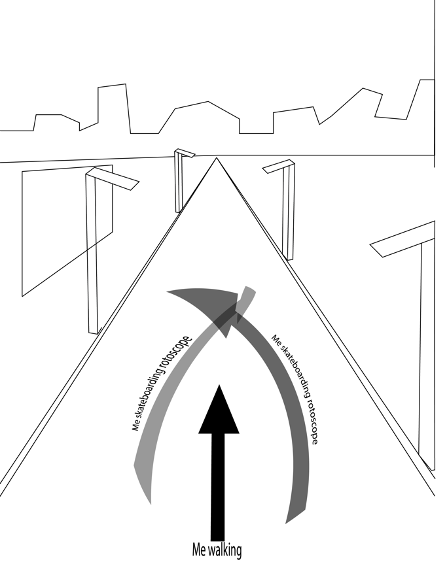
Plan for a shot – There’s this really long footpath that runs along the train line that I skate along on my way to and from Mentone train station. The trainlines on the right and fences of houses on the left. The sketch below is just an idea of the motion that I’d display. Me walking down the centre at a normal speed while rotoscopes of me skateboarding along this road in a sort of snakey 8 shaped pattern are slowed and overlayed.
In many of Schyguyys videos he uses this technique of displaying many of himself moving in the one static environment. This has many implications:
Displays the how one can get lost in the moment while in these spaces, not acknowledging the passing of time. Him occupying multiple areas in the space in just a few seconds (displayed simultaneously) gives us a sense that he is fully in the moment in each position he’s in (similar to flow state) but is obviously moving somewhere and time is passing in this uncontrollable but nonchalant nature.
It’s also generally an unreal and interesting visual effect.
At this point, this effect has been seen many times by most social media consumers so it won’t be too shocking or unreal.
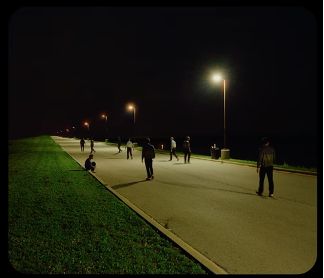
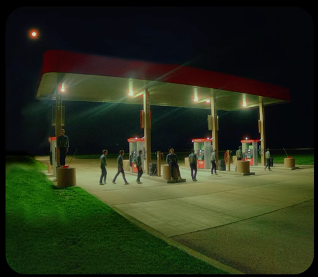
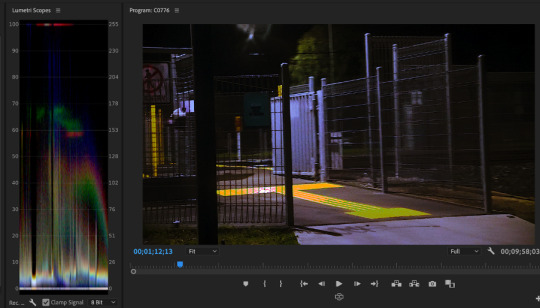
I’m really happy with my first colour grade. A lot of liminal space photography and videography is done with early 2000s or even 90s cameras which give it a “nostalgic” feeling. However, for Gen Z, this shouldn’t be the case; but we still do find that footage like that or footage edited to have more grain and old-school saturation nostalgic or reminiscent in some way, likely for a slightly different reason to millennials.
The result of my colour grade displays the clarity that modern cameras can film and the old school/Y2Kish look commonly used to give a dream-like affect in media today. In a way I believe this is a better choice than just using an old camera because it keeps things looking real and current. I want the viewer to not so much reminisce of the past while in a liminal space (viewing one) but rather be in the present with a subtle nostalgic comfort clouding the mind. This balance of the old and new is liminal in itself. Perhaps liminality is some sort of spirituality I’ve yet to research. We quite often hear “Don’t dwell on on the past” or “focus on the future” when talking about negative experiences, which often annoys me as I know they’re just way to comfort someone and make them feel better. It’s becoming more and more apparent to me that Liminal Spaces are not just liminal because of the cognitive attribution to a transitional/developmental phase (e.g., Streets from age 9-17), they can contain myriad forms of liminality.
My shot displayed above is liminal through the transitional phase attribution, the aesthetic is between real and unreal, and the use of new equipment and but old style is inherently liminal as well.
Let’s focus in on why this is Exhilarating.
We are already aware that exhilaration is not objective and that many people have likely internalised a limited meaning of the word; typically, just a further extent of exciting.
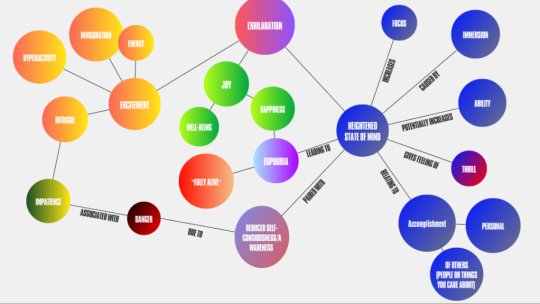
The stylistic choice of having the old style on the clarity of modern video cameras was made through considering how exhilaration without narrative motivation usually needs to make the viewer or experiencer feel as though they’re the present; if the footage looks too unrealistic or unrelatable we won’t easily feel it. Whereas with maintaining the dreamy nostalgic style with the clarity of modern cameras I believe the exhilaration will come more smoothly.
There’s usually some sort of progression to Schyguyys videos. If I want to make my video 40 seconds long it needs a narrative. Some of Schyguyys earlier videos had no narrative, the video that led me to follow him was one of these. Seamless match cuts and Synthwave baby! https://www.instagram.com/p/CkbA8FOA5gf/ So, it’s clear that not having a narrative works for a certain amount of time it’s just unclear how long that is. I’ll have to look further into it.
Heres a little snippit of my rotoscoped mes' doing their thang.
Works Cited:
Kotler, K. Kaufman, S.B. (2023) The Psychology Podcast. [Podcast]. 23 February 2023. Available at: https://open.spotify.com/episode/1YYXQvD4uyU9dzTqxrxu3M?si=PalNPOqrRS6Mw3U1XojL1A&context=spotify%3Ashow%3A4POIiQQjnQOuz0AqnLk3KZ&nd=1
John Veraeke (2022) Principles & Methods for Achieving a Flow State | Voices w/ Vervaeke | John Vervaeke & Kevin Bowers. Available at: https://www.youtube.com/watch?v=iteirgNDKrg
0 notes